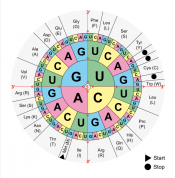Aggregated News

At first glance the advance seems abstruse, promising anodyne applications such as making genetically modified bacteria that resist viral infection. (Those infections are problematic for industries that use bacteria to synthesize chemicals and drugs, costing them billions of dollars a year.) But the experiment, published Thursday in Science, is also a significant step toward a much grander project: recoding life.
If this were literature rather than biology, the feat would be akin to replacing all 1,611 instances of the word “wand” in the “Harry Potter” series, plus all 464 “wizard”s and more, and finding that the books still made magical sense. The scientists believe that genomes don’t need all 64 of the words they...



